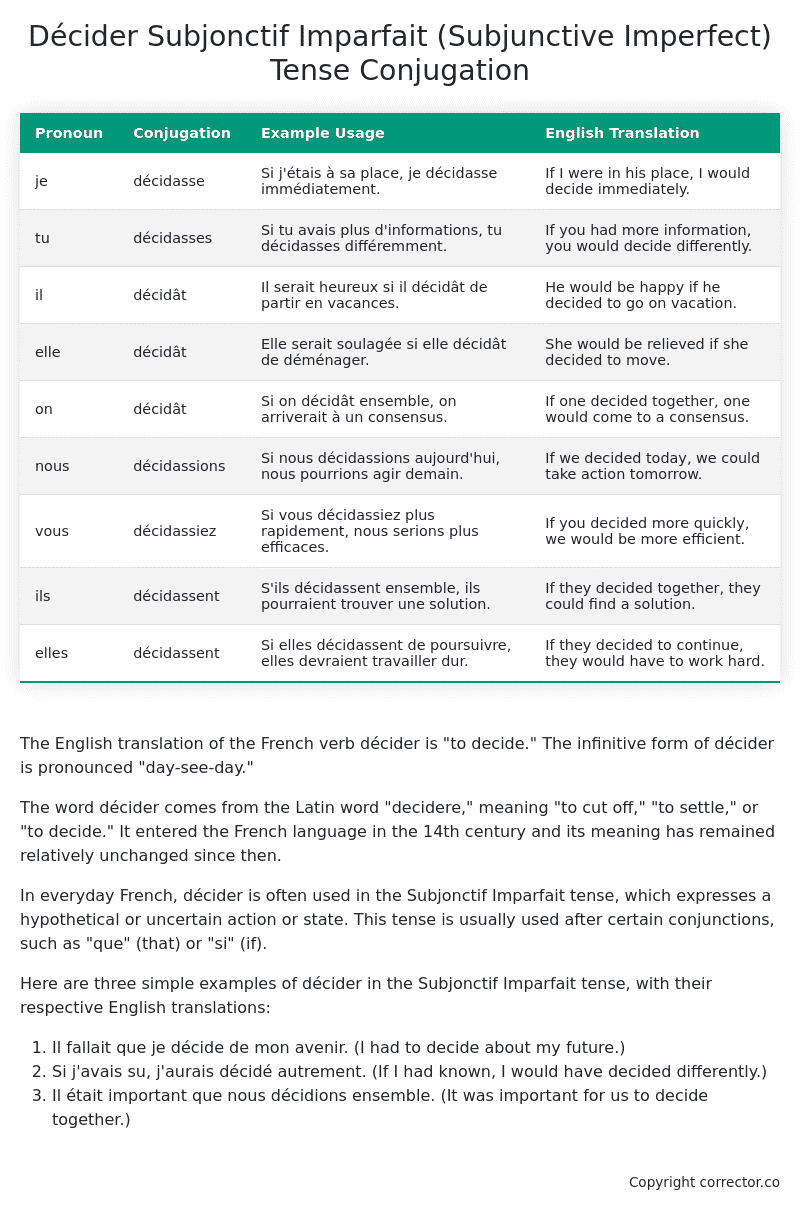Subjonctif Imparfait (Subjunctive Imperfect) Tense Conjugation of the French Verb décider
Introduction to the verb décider
The English translation of the French verb décider is “to decide.” The infinitive form of décider is pronounced “day-see-day.”
The word décider comes from the Latin word “decidere,” meaning “to cut off,” “to settle,” or “to decide.” It entered the French language in the 14th century and its meaning has remained relatively unchanged since then.
In everyday French, décider is often used in the Subjonctif Imparfait tense, which expresses a hypothetical or uncertain action or state. This tense is usually used after certain conjunctions, such as “que” (that) or “si” (if).
Here are three simple examples of décider in the Subjonctif Imparfait tense, with their respective English translations:
- Il fallait que je décide de mon avenir. (I had to decide about my future.)
- Si j’avais su, j’aurais décidé autrement. (If I had known, I would have decided differently.)
- Il était important que nous décidions ensemble. (It was important for us to decide together.)
Table of the Subjonctif Imparfait (Subjunctive Imperfect) Tense Conjugation of décider
| Pronoun | Conjugation | Example Usage | English Translation |
|---|---|---|---|
| je | décidasse | Si j’étais à sa place, je décidasse immédiatement. | If I were in his place, I would decide immediately. |
| tu | décidasses | Si tu avais plus d’informations, tu décidasses différemment. | If you had more information, you would decide differently. |
| il | décidât | Il serait heureux si il décidât de partir en vacances. | He would be happy if he decided to go on vacation. |
| elle | décidât | Elle serait soulagée si elle décidât de déménager. | She would be relieved if she decided to move. |
| on | décidât | Si on décidât ensemble, on arriverait à un consensus. | If one decided together, one would come to a consensus. |
| nous | décidassions | Si nous décidassions aujourd’hui, nous pourrions agir demain. | If we decided today, we could take action tomorrow. |
| vous | décidassiez | Si vous décidassiez plus rapidement, nous serions plus efficaces. | If you decided more quickly, we would be more efficient. |
| ils | décidassent | S’ils décidassent ensemble, ils pourraient trouver une solution. | If they decided together, they could find a solution. |
| elles | décidassent | Si elles décidassent de poursuivre, elles devraient travailler dur. | If they decided to continue, they would have to work hard. |
Other Conjugations for Décider.
Le Present (Present Tense) Conjugation of the French Verb décider
Imparfait (Imperfect) Tense Conjugation of the French Verb décider
Passé Simple (Simple Past) Tense Conjugation of the French Verb décider
Passé Composé (Present Perfect) Tense Conjugation of the French Verb décider
Futur Simple (Simple Future) Tense Conjugation of the French Verb décider
Futur Proche (Near Future) Tense Conjugation of the French Verb décider
Plus-que-parfait (Pluperfect) Tense Conjugation of the French Verb décider
Passé Antérieur (Past Anterior) Tense Conjugation of the French Verb décider
Futur Antérieur (Future Anterior) Tense Conjugation of the French Verb décider
Subjonctif Présent (Subjunctive Present) Tense Conjugation of the French Verb décider
Subjonctif Passé (Subjunctive Past) Tense Conjugation of the French Verb décider
Subjonctif Imparfait (Subjunctive Imperfect) Tense Conjugation of the French Verb décider (this article)
Subjonctif Plus-que-parfait (Subjunctive Pluperfect) Tense Conjugation of the French Verb décider
Conditionnel Présent (Conditional Present) Tense Conjugation of the French Verb décider
Conditionnel Passé (Conditional Past) Tense Conjugation of the French Verb décider
L’impératif Présent (Imperative Present) Tense Conjugation of the French Verb décider
L’infinitif Présent (Infinitive Present) Tense Conjugation of the French Verb décider
Struggling with French verbs or the language in general? Why not use our free French Grammar Checker – no registration required!
Get a FREE Download Study Sheet of this Conjugation 🔥
Simply right click the image below, click “save image” and get your free reference for the décider Subjonctif Imparfait tense conjugation!

Décider – About the French Subjonctif Imparfait (Subjunctive Imperfect) Tense
Formation
Common Everyday Usage Patterns
Interactions with Other Tenses
Subjonctif Présent
Indicatif Passé Composé
Conditional
Conditional Perfect
Summary
I hope you enjoyed this article on the verb décider. Still in a learning mood? Check out another TOTALLY random French verb conjugation!


